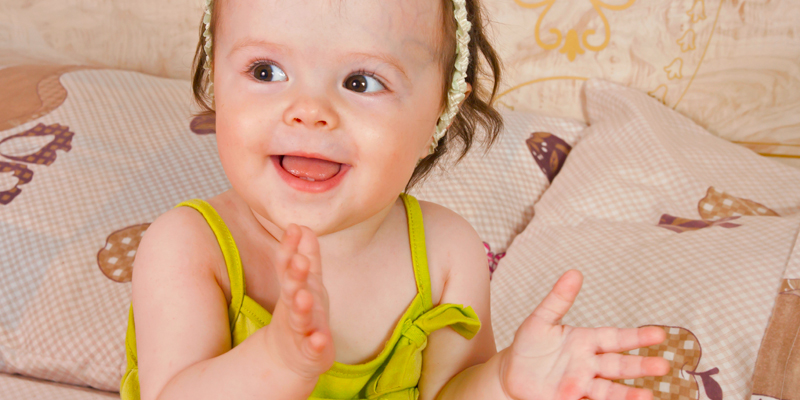
Someone’s Listening! Your Baby’s Receptive Language Skills
Though not as obvious as your baby’s growing ability to speak, at 6-9 months, her Receptive Language skills are also becoming more complex. Receptive Language skills refer to her ability to understand language in a number of different settings. Babies usually have receptive language skills long before they are able to talk. By six months of age, your baby knows there is a whole world of communication around her, and she’s excited to get involved in any way that she can.
(SPECIAL OFFER: Sign up for Playful Bee’s Bee Well developmental learning program to give your baby the best start in life. The first 10,000 children enroll for FREE! Sign up today.)
By now, she is probably responding more when she hears her name being called1 and when she hears the word “no.” Her vocabulary is growing, and she understands much of what you say about common objects used in everyday life. She is also paying more attention to what you are saying and how you are saying it. This is when you should focus on how you communicate with your baby because you are her role model. She will learn to communicate as well (or as poorly) as you do!
The best thing to do is to speak to your baby in a positive and helpful way. While it’s good to give praise when and where credit is due, don’t fall into the trap of always saying “good job” or “good girl.” These words are too vague, so they fall short of letting her know what it was that earned the praise in the first place.2 Instead, try to recap and describe specifically what she did or is doing that you appreciate. Give positive feedback, such as “Look at how you ate all of your broccoli,” “Wow, that’s a hard puzzle to put together, but you did it,” or “Thank you for helping me put your pants on; you’re so big!” By being specific in your praise, you are not only sharing new vocabulary, but you are also helping to build associations between vocabulary words and specific actions. This type of process praise3 also helps to motivate children and provides realistic expectations.
Non-verbal feedback is also really important at this stage4 because it is still the method of communication your baby understands best. Pick her up for a hug after she finishes a drawing, or give her back a rub when you see her working hard at a task and say, “I love how you kept working until you figured it out!” Non-verbal feedback is the most immediate, best understood, and often the most satisfying reward to your baby at this stage.
Play Tips:
Do you want to know how you can support your baby’s development of these Receptive Language skills at this age? It’s easy! Read on for some simple tips to incorporate into your daily play time together.
- Keep talking to your baby clearly, face-to-face. Watching your mouth move while you speak is key to helping your baby learn how to form speech sounds. The more you speak to her, the more quickly she will develop language skills.
- Respond to your baby’s speech.3 A child who has an interested and captive audience is more likely to continue the conversation. Knowing that people care and are interested in what she has to say will encourage your baby to keep on talking. In addition, avoid praising her for her communication efforts, and simply respond to what she’s trying to tell you.3 Getting her message across will be far more satisfying than any praise offered!
- Add context to your speech. You can help develop your baby’s vocabulary by showing her the objects related to what you’re talking about.5 The next time you talk to her, be sure to hold up a cup when asking if she’d like a drink or point to her coat when you talk about what you need to go outside.
(SPECIAL OFFER: Sign up for Playful Bee’s Bee Well developmental learning program to give your baby the best start in life. The first 10,000 children enroll for FREE! Sign up today.)
Developmental Milestones:
Has your baby achieved the following Receptive Language developmental milestones yet? If yes, check off all the skill(s) he has already mastered to date using Playful Bee’s developmental milestones tracker. It’s absolutely FREE and easy to use, just click HERE!
- Begins to respond to “no.”
Sources:
1Maryland State Department of Education (2010). Healthy Beginnings: Supporting Development and Learning from Birth through Three Years of Age.
2NAEYC (National Association for the Education of Young Children). “Good Job” Alternatives. NAEYC: Teaching Young Children. Retrieved November 18, 2014, from http://www.naeyc.org/tyc/article/good-job-alternatives.
3Lowry, Lauren (2011). “Good Job!” Is Praising Young Children a Good Idea? The Hanen Center. Retrieved December 15, 2013 from http://www.hanen.org/Helpful-Info/Articles/Good-job!-Is-Praising-Young-Children-a-Good-idea.aspx.
4Raising Children Network (2014). Speaking without Words: Body Language and Tone of Voice. Raising Children: the Australian Parenting Website. Retrieved November 18, 2014, from http://raisingchildren.net.au/articles/body_language_tone_of_voice.html.
5PBS Parents. Baby Language Development Milestones. Public Broadcasting Service: PBS Parents. Retrieved November 18, 2014, from http://www.pbs.org/parents/education/reading-language/reading-milestones/baby-language-development-milestones/.
Bayat, M. (2011). Clarifying Issues Regarding the Use of Praise with Young Children. Topics in Special Education, 31(2), 121-128.
Playful Bee
Latest posts by Playful Bee (see all)
- Have a Super Fortune Cookie Friday! - February 9, 2018
- All Kinds of Shapes: Your Child Is Learning Simple Shapes, and Drawing Them Too! - November 13, 2017
- Fishing for Sneakers: Create your own Hand-Eye Coordination Fun - November 11, 2017

+ There are no comments
Add yours